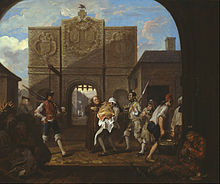
Henry Fielding was an English writer and magistrate known for the use of humour and satire in his works. His 1749 comic novel The History of Tom Jones, a Foundling was a seminal work in the genre. Along with Samuel Richardson, Fielding is seen as the founder of the traditional English novel. He also played an important role in the history of law enforcement in the United Kingdom, using his authority as a magistrate to found the Bow Street Runners, London's first professional police force.
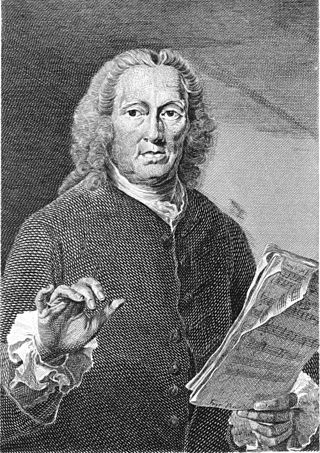
Richard Leveridge was an English bass singer of the London stage and a composer of baroque music, including many popular songs.
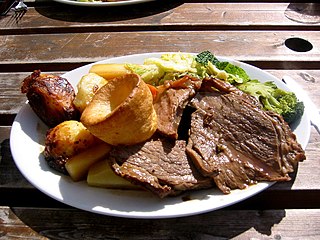
A Sunday roast or roast dinner is a traditional meal of British origin. Although it can be consumed throughout the week, it is traditionally consumed on Sunday. It consists of roasted meat, roasted potatoes, mashed potatoes and accompaniments such as Yorkshire pudding, stuffing, gravy, and condiments such as apple sauce, mint sauce, or redcurrant sauce. A wide range of vegetables can be served as part of a roast dinner, such as broccoli, Brussels sprouts, cabbage, carrots, cauliflower, parsnips, or peas, which can be boiled, steamed, or roasted alongside the meat and potatoes.

A picnic is a meal taken outdoors as part of an excursion, especially in scenic surroundings, such as a park, lakeside, or other place affording an interesting view, or else in conjunction with a public event such as preceding an open-air theater performance, and usually in summer or spring. It is different from other meals because it requires free time to leave home.
"Lillibullero" is a march attributed to Henry Purcell that became popular in England at the time of the Glorious Revolution of 1688.

The mess is a designated area where military personnel socialize, eat and live. The term is also used to indicate the groups of military personnel who belong to separate messes, such as the officers' mess, the chief petty officer mess, and the enlisted mess. In some civilian societies this military usage has been extended to the eating arrangements of other disciplined services such as fire fighting and police forces.

A fife and drum corps is a musical ensemble consisting of fifes and drums. In the United States of America, fife and drum corps specializing in colonial period impressions using fifes, rope tension snare drums and rope tension bass drums are known as Ancient Fife and Drum Corps. Many of these ensembles originated from a type of military field music.

"Low Bridge, Everybody Down" is a folk song credited to Thomas S. Allen, first recorded in 1912, and published by F.B. Haviland Publishing Company in 1913. It was written after the construction of the New York State Barge Canal, which would replace the Erie Canal, was well underway, furthering the change from mule power to engine power, raising the speed of traffic. Also known as "Fifteen Years on the Erie Canal", "Fifteen Miles on the Erie Canal", "Erie Canal Song", "Erie Barge Canal", and "Mule Named Sal", the song memorializes the years from 1825 to 1880 when the mule barges made boomtowns out of Utica, Rome, Syracuse, Rochester, and Buffalo, and transformed New York into the Empire State.
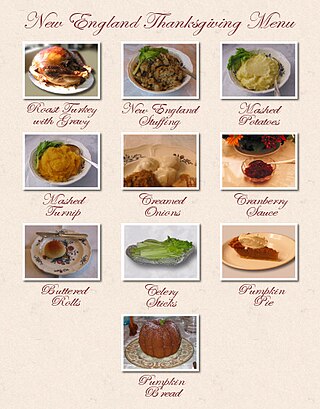
The centerpiece of contemporary Thanksgiving in the United States is Thanksgiving dinner, a large meal generally centered on a large roasted turkey. Thanksgiving could be considered the largest eating event in the United States as measured by retail sales of food and beverages and by estimates of individual food intake. People often consume as much as three or four thousand calories during the course of the dinner.
"Sussex by the Sea" is a song written in 1907 by William Ward-Higgs, often considered to be the unofficial county anthem of Sussex. It became well known throughout Sussex and is regularly sung at celebrations throughout the county. It can be heard during many sporting events in the county, during the Sussex bonfire celebrations and it is played by marching bands and Morris dancers across Sussex. It is the adopted song of Brighton & Hove Albion Football Club, Sussex Division Royal Naval Reserve, Sussex Association of Naval Officers and Sussex County Cricket Club.

"The U.S. Air Force" is the official song of the United States Air Force, adopted in the late 1940s, and is often referred to as "Wild Blue Yonder".
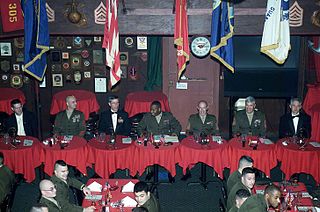
Dining in is a formal military ceremony for members of a company or other unit, which includes a dinner, drinking, and other events to foster camaraderie and esprit de corps.
"The Lincolnshire Poacher" is a traditional English folk song associated with the county of Lincolnshire, and deals with the joys of poaching. It is considered to be the unofficial county anthem of Lincolnshire. It is catalogued as Roud Folk Song Index No. 299.
Soldiers of the Queen is a song written and composed by Leslie Stuart. The song is often sung and published as "Soldiers of the King" depending on the reigning monarch at the time. The tune was originally composed by Stuart as a march celebrating the opening of the Manchester Ship Canal. The lyrics were added at a later date and the title changed. The song was then interpolated in the musical comedy An Artist's Model (1895).
Events from the year 1735 in Great Britain.
The culture of the United States Marine Corps is widely varied but unique amongst the branches of the United States Armed Forces. Because members of the Marine Corps are drawn from across the United States, it is as varied as each individual Marine but tied together with core values and traditions passed from generation to generation of Marines. As in any military organization, the official and unofficial traditions of the Marine Corps serve to reinforce camaraderie and set the service apart from others. The Corps' embracement of its rich culture and history is cited as a reason for its high esprit de corps.
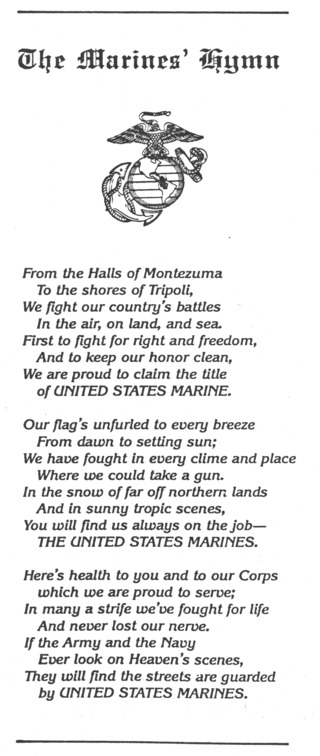
The "Marines' Hymn" is the official hymn of the United States Marine Corps, introduced by the first director of the USMC Band, Francesco Maria Scala. Its music originates from an 1867 work by Jacques Offenbach with the lyrics added by an anonymous author at an unknown time in the following years. Authorized by the Commandant of the Marine Corps in 1929, it is the oldest official song in the United States Armed Forces. The "Marines' Hymn" is typically sung at the position of attention as a gesture of respect, akin to a national anthem. However, the third verse is also used as a toast during formal events, such as the birthday ball and other ceremonies.

Pea soup or split pea soup is soup made typically from dried peas, such as the split pea. It is, with variations, a part of the cuisine of many cultures. It is most often greyish-green or yellow in color depending on the regional variety of peas used; all are cultivars of Pisum sativum.

The Modern Cook was the first cookery book by the Anglo-Italian cook Charles Elmé Francatelli (1805–1876). It was first published in 1846. It was popular for half a century in the Victorian era, running through 29 London editions by 1896. It was also published in America.
Soup and Bouilli in England is a dish of boiled beef and root vegetables based on the traditional French dish pot-au-feu. The name comes from the general method in France of serving pot-au-feu as two courses—la soupe et le bouilli. In England as in France, bouilli referred to the boiled meat.

